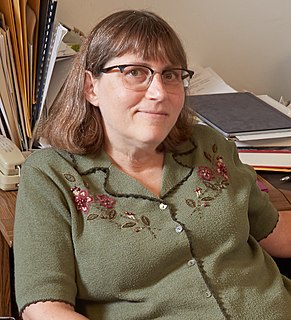A Quote by Stephen Jay Gould
I was lucky to wander into evolutionary theory, one of the most exciting and important of all scientific fields. I had never heard of it when I started at a rather tender age; I was simply awed by dinosaurs. I thought paleontologists spent their lives digging up bones and putting them together, never venturing beyond the momentous issue of what connects to what. Then I discovered evolutionary theory. Ever since then, the duality of natural history-richness in particularities and potential union in underlying explanation-has propelled me.
Quote Topics
Age
Beyond
Bones
Connects
Digging
Dinosaurs
Discovered
Duality
Ever
Evolutionary
Exciting
Explanation
Fields
Had
Heard
History
Important
Issue
Lives
Lucky
Me
Momentous
Most
Natural
Natural History
Never
Potential
Putting
Rather
Richness
Scientific
Simply
Since
Spent
Started
Tender
Them
Then
Theory
Thought
Together
Underlying
Union
Up
Wander
Related Quotes
The more evolutionary theory gets called an atheistic theory, the greater the risk that it will lose its place in public school biology courses in the United States. If the theory is thought of in this way, one should not be surprised if a judge at some point decides that teaching evolutionary theory violates the Constitutional principle of neutrality with respect to religion.
The theory of natural selection is the centerpiece of The Origin of Species and of evolutionary theory. It is this theory that accounts for the adaptations of organisms, those innumerable features that so wonderfully equip them for survival and reproduction; it is this theory that accounts for the divergence of species from common ancestors and thus for the endless diversity of life. Natural selection is a simple concept, but it is perhaps the most important idea in biology.
Considering that we live in an era of evolutionary everything---evolutionary biology, evolutionary medicine, evolutionary ecology, evolutionary psychology, evolutionary economics, evolutionary computing---it was surprising how rarely people thought in evolutionary terms. It was a human blind spot. We look at the world around us as a snapshot when it was really a movie, constantly changing.
Natural Selection is not Evolution. Yet, ever since the two words have been in common use, the theory of Natural Selection has been employed as a convenient abbreviation for the theory of Evolution by means of Natural Selection, put forward by Darwin and Wallace. This has had the unfortunate consequence that the theory of Natural Selection itself has scarcely ever, if ever, received separate consideration.
And, partly, I had found that theory-structure was a superpower in helping one get what one wanted. As I had early discovered in school wherein I had excelled without labor, guided by theory, while many others, without mastery of theory failed despite monstrous effort. Better theory I thought had always worked for me and, if now available could make me acquire capital and independence faster and better assist everything I loved.
The scientific theorist is not to be envied. For Nature, or more precisely experiment, is an exorable and not very friendly judge of his work. It never says "yes" to a theory. In the most favorable cases it says "Maybe," and in the great majority of cases simply "No." If an experiment agrees with a theory it means for the latter "Maybe," and if it does not agree it means "No." Probably every theory will some day experience its "No" - most theories, soon after conception.
Well, it [evolution] is a theory, it is a scientific theory only, and it has in recent years been challenged in the world of science and is not yet believed in the scientific community to be as infallible as it once was believed. But if it was going to be taught in the schools, then I think that also the biblical theory of creation, which is not a theory but the biblical story of creation, should also be taught.



































